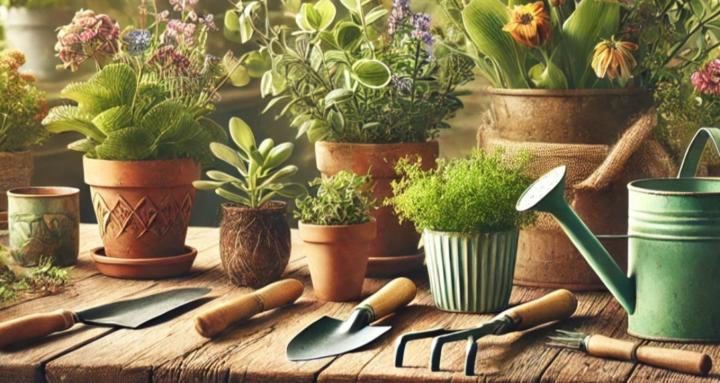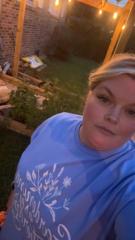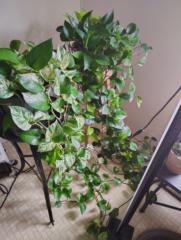May 29 • Garden Gear & DIY Hacks
Celebrate and Learn About Composting Day: Tips for Composting in Small Spaces
Learn About Composting Day (May 29th) is the perfect time to explore how even container gardeners with small yards—or no yards at all—can create nutrient-rich compost to feed their plants naturally. Composting isn’t just for large gardens; it’s totally doable in tight spaces with the right approach!
𝐖𝐡𝐲 𝐂𝐨𝐦𝐩𝐨𝐬𝐭?
Compost is a powerful soil amendment made from decomposed organic matter. It improves soil texture, adds essential nutrients, and boosts beneficial microbes—all of which help your container plants thrive.
𝐂𝐨𝐦𝐩𝐨𝐬𝐭𝐢𝐧𝐠 𝐢𝐧 𝐒𝐦𝐚𝐥𝐥 𝐒𝐩𝐚𝐜𝐞𝐬: 𝐘𝐨𝐮𝐫 𝐎𝐩𝐭𝐢𝐨𝐧𝐬
Here are a few composting methods that work well for container gardeners:
𝟏. 𝐂𝐨𝐮𝐧𝐭𝐞𝐫𝐭𝐨𝐩 𝐂𝐨𝐦𝐩𝐨𝐬𝐭 𝐁𝐢𝐧𝐬
Great for collecting food scraps like veggie peels, coffee grounds, and eggshells. These small bins don’t compost on their own but serve as a tidy way to collect materials before transferring to your main system.
𝟐. 𝐖𝐨𝐫𝐦 𝐁𝐢𝐧𝐬 (𝐕𝐞𝐫𝐦𝐢𝐜𝐨𝐦𝐩𝐨𝐬𝐭𝐢𝐧𝐠)
Perfect for apartments or indoor use, worm bins house red wigglers that break down kitchen scraps into worm castings—an incredibly rich fertilizer.
𝐁𝐞𝐬𝐭 𝐟𝐨𝐫: Indoor or sheltered patios, odor-free and compact
𝟑. 𝐓𝐮𝐦𝐛𝐥𝐞𝐫 𝐂𝐨𝐦𝐩𝐨𝐬𝐭𝐞𝐫𝐬
These closed compost bins are ideal for patios or small yards. They’re easy to turn, pest-resistant, and speed up the composting process.
𝐁𝐞𝐬𝐭 𝐟𝐨𝐫:Small outdoor spaces with room for a barrel-style composter
𝟒. 𝐁𝐨𝐤𝐚𝐬𝐡𝐢 𝐁𝐮𝐜𝐤𝐞𝐭𝐬
This fermentation method breaks down food waste anaerobically using special inoculated bran. It’s fast, odor-controlled, and great for urban gardeners.
𝐁𝐞𝐬𝐭 𝐟𝐨𝐫: Indoors, garages, or covered porches
𝐖𝐡𝐚𝐭 𝐘𝐨𝐮 𝐂𝐚𝐧 𝐂𝐨𝐦𝐩𝐨𝐬𝐭
* Fruit and veggie scraps
* Coffee grounds and filters
* Tea bags (without staples)
* Crushed eggshells
* Shredded newspaper or cardboard (for carbon)
* Plant trimmings
𝐖𝐡𝐚𝐭 𝐭𝐨 𝐀𝐯𝐨𝐢𝐝
* Meat, dairy, and oily foods (can attract pests)
* Diseased plant material
* Glossy or colored paper
𝐓𝐢𝐩𝐬 𝐟𝐨𝐫 𝐒𝐮𝐜𝐜𝐞𝐬𝐬
* 𝐁𝐚𝐥𝐚𝐧𝐜𝐞 𝐠𝐫𝐞𝐞𝐧𝐬 𝐚𝐧𝐝 𝐛𝐫𝐨𝐰𝐧𝐬: Mix nitrogen-rich “green” materials (like kitchen scraps) with carbon-rich “browns” (like shredded paper).
* 𝐂𝐡𝐨𝐩 𝐢𝐭 𝐬𝐦𝐚𝐥𝐥: Smaller pieces break down faster.
* 𝐊𝐞𝐞𝐩 𝐢𝐭 𝐦𝐨𝐢𝐬𝐭 (𝐥𝐢𝐤𝐞 𝐚 𝐰𝐫𝐮𝐧𝐠-𝐨𝐮𝐭 𝐬𝐩𝐨𝐧𝐠𝐞): Not too wet, not too dry.
* 𝐓𝐮𝐫𝐧 𝐨𝐫 𝐬𝐭𝐢𝐫 𝐫𝐞𝐠𝐮𝐥𝐚𝐫𝐥𝐲: Aeration speeds up decomposition.
𝐔𝐬𝐢𝐧𝐠 𝐘𝐨𝐮𝐫 𝐂𝐨𝐦𝐩𝐨𝐬𝐭 𝐢𝐧 𝐂𝐨𝐧𝐭𝐚𝐢𝐧𝐞𝐫𝐬
𝐅𝐢𝐧𝐢𝐬𝐡𝐞𝐝 𝐜𝐨𝐦𝐩𝐨𝐬𝐭 𝐜𝐚𝐧 𝐛𝐞:
* Mixed into potting soil for extra nutrients
* Used as a top dressing around container plants
* Brewed into compost tea for a nutrient-rich liquid feed
𝐂𝐞𝐥𝐞𝐛𝐫𝐚𝐭𝐞 𝐒𝐮𝐬𝐭𝐚𝐢𝐧𝐚𝐛𝐥𝐲
This Learn About Composting Day, take a small but powerful step toward sustainability by starting your own composting system. Whether you have a windowsill or a tiny patio, you can turn kitchen scraps into garden gold for your container plants!
Happy Composting! ♻️🌱
4
3 comments

skool.com/gardening
🌱 Unlock your green thumb in the most supportive container gardening group online — exclusive tips, plant hacks, and growing wins await!
Powered by





